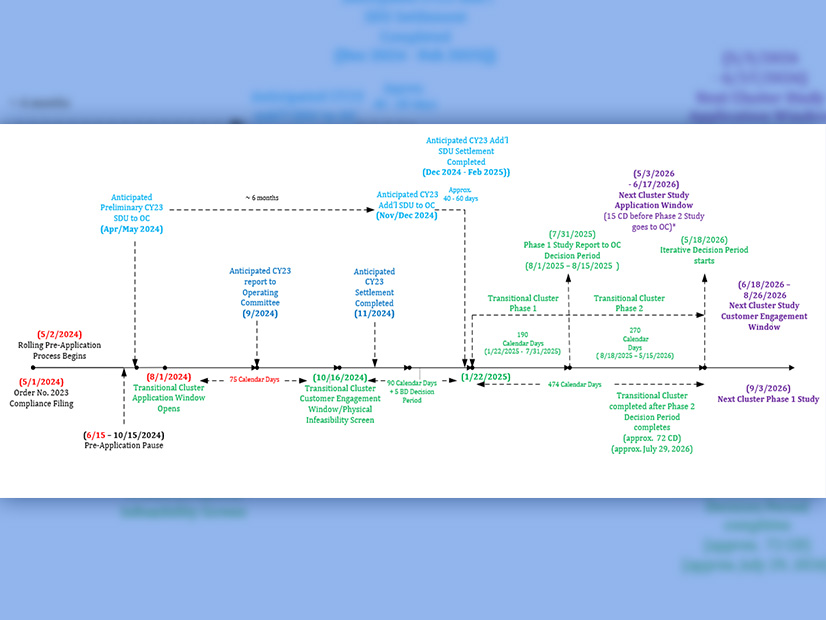NYISO on April 1 informed the Transmission Planning Advisory Subcommittee (TPAS) and Electric System Planning Working Group (ESPWG) it intends to seek a May 2 effective date for Order 2023.
The ISO plans to submit its full compliance filing May 1, about a month after FERC’s original April 3 deadline. The commission last month issued Order 2023-A, with minor modifications and clarifications of the new generator interconnection rules, and rejected multiple requests for rehearing. (See FERC Upholds, Clarifies Generator Interconnection Rule.)
The commission extended the compliance deadline 30 days after Order 2023-A’s publication in the Federal Register; as of press time, the revised order has not been published.
Due to the filing delay, NYISO rescheduled the start of the pre-application process to May 2 and shifted the opening of the transition cluster application window to Aug. 1, shortening the window from 105 calendar days to 75. Additionally, NYISO’s proposed pause on accepting new interconnection requests will now commence June 15. (See NYISO to Pause New Interconnection Requests for 3 Months in Order 2023 Transition.)
Although NYISO’s timeline for the transition cluster and subsequent interconnection processes remains largely unchanged, potential adjustments may occur if FERC does not approve the requested effective date or if stakeholder motions prompt the commission to delay its ruling on the compliance filing, the ISO said.
FERC recently approved NYISO’s proposed tariff adjustments designed to improve the coordination between its interconnection and transmission planning processes. The revisions, formulated prior Order 2023’s issuance, were recognized by the commission as part of the permissible independent entity variations transmission providers can incorporate into their compliance. (See FERC Accepts NYISO Proposal to Coordinate Queue, Transmission Processes.)
Dave Andrus, an executive consultant with Power Consulting Services, asked if NYISO has a better sense of whether FERC was more amenable to such variations after issuing the revised order.
Sara Keegan, NYISO’s assistant general counsel, said FERC’s stance on variations is unchanged and firmly established, but she added that “when you read this order, compared to the original order, it does provide additional areas in which the commission opens the door for independent entity variations, such as study timelines.”
Glenn Haake, vice president of regulatory affairs at Invenergy, asked about the perceived discrepancy between FERC’s and NYISO’s treatments of inverter-based resources (IBRs), suggesting that the commission’s approach is more lenient than the ISO’s, which based its approach to IBRs on rules recently approved by the New York State Reliability Council (NYSRC). (See New York Approves Final Rule on Inverter-based Resources.)
“As is often the case with the NYSRC, their rules tend to be more stringent than say NERC or even the NPCC [Northeast Power Coordinating Council], and that is the justification for our own compliance filing being more stringent than what was in the commission’s order,” Keegan responded.
NYISO said it will present a detailed overview of its Order 2023 compliance filing updates at the next Interconnection Issues Task Force meeting April 15.
NYISO senior manager of interconnection projects Thinh Nguyen requested stakeholders direct any feedback regarding NYISO’s Order 2023 compliance filing to stakeholder_services@nyiso.com.
Class Year, Expedited Deliverability Study Updates
NYISO also told the ESPWG and TPAS it initiated the 2024 Expedited Deliverability Study (EDS 2024-01) on March 28, with a total of 20 projects requesting participation.
ISO staff are evaluating each project’s eligibility for EDS 2024-01 inclusion and plans to issue agreements to eligible project developers. The goal is for developers to finalize their EDS agreements in time for NYISO to present a finalized list of EDS 2024-01 projects to stakeholders in May, though this list may not include all 20 projects. The EDS process is designed to streamline integration of projects seeking capacity resource interconnection service (CRIS) rights by determining if a project can be delivered as proposed without requiring system deliverability upgrades. In February, NYISO’s Operating Committee approved the results from the previous EDS study, EDS 2023-01, which evaluated 16 projects, of which 14 were deemed deliverable. (See NYISO Operating Committee Briefs: Feb. 15, 2024.)
NYISO also informed stakeholders of the completion of validations for all 83 projects in Class Year 2023, down one from the previous total after a CRIS-only project in Zone C, Q1059 Jaton Solar, withdrew from the study queue. A list of CY23 participants is available online.
The CY23 draft report is expected to be finished and submitted to the OC for approval by September.



